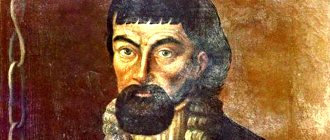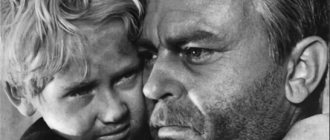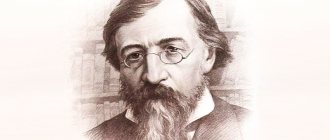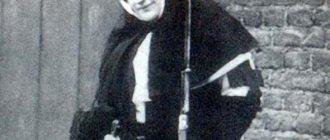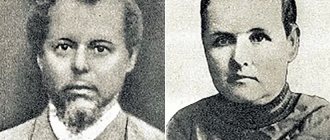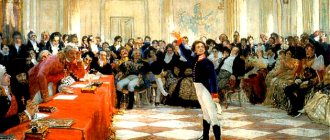The pilot, who received leg injuries, made an emergency landing in territory occupied by German troops. It took him 18 days to crawl to the front line, from where he was sent to the hospital and had both legs amputated, after which he again went to the front as a fighter pilot. Subsequently, the feat of Alexei Maresyev became the basis of the plot of “The Tale of a Real Man” by Boris Polevoy.
Alexey Petrovich Maresyev was born on May 29, 1916 (old style May 16) in the city of Kamyshin, Kamyshinsky district, Saratov province of the Russian Empire (now the administrative center of the Kamyshinsky district of the Volgograd region).
TASS recalls the life of the legendary pilot and his feat.
Family
- Father - Pyotr Avdeevich Maresyev, a soldier of the First World War, died of tuberculosis when Alexei was three years old.
- Mother - Ekaterina Nikitichna Maresyeva, worked as a cleaner at a factory. Alexey was the youngest of her four sons.
- Alexey Maresyev was married to Galina Viktorovna Maresyeva (née Tretyakova, died in 2002), an employee of the Air Force University Directorate.
- The eldest son is Victor (born 1946), an automotive engineer, now the president of the Regional Public Fund A.P. Maresyeva "Disabled people of the Second World War."
- The youngest son is Alexey (1958–2002).
Studies
- In 1930 in Kamyshin he graduated from six (according to other sources - seven) classes of school, in 1930–1932. At the Kamyshin factory apprenticeship school (FZU) he mastered the profession of a turner.
- In 1933–1934 without interruption from work he studied at the Kamyshin Workers' Faculty named after. M. Gorky Saratov Agricultural Institute (now Saratov State Agrarian University).
- In 1940 he graduated from the Bataysk Military Aviation Pilot School named after A.K. Serov (now the Krasnodar Higher Military Aviation School of Pilots), in 1952 - the Higher Party School under the CPSU Central Committee, in 1956 - graduate school at the Academy of Social Sciences under the CPSU Central Committee. Candidate of Historical Sciences (1956).
Work and service
- In 1933–1934 worked at the Kamyshin timber mill as an oil worker and turner.
- In 1934 he was sent to the construction of Komsomolsk-on-Amur, where from March 1935 to August 1937 he worked as a lumberjack, then as a diesel mechanic on the Partizan boat. I studied at the flying club.
- In the fall of 1937 he was drafted into the ranks of the Workers 'and Peasants' Red Army (RKKA), and until 1938 he served in the 12th aviation border detachment on Sakhalin Island.
- In 1939 he was sent to the Chita Aviation School.
- Since 1940, he has been an instructor pilot at the Bataysk Military Aviation School of Pilots.
- With the beginning of the Great Patriotic War of 1941–1945. sent to the Southwestern Front (first combat mission - August 23, 1941 in the Krivoy Rog region).
- He was a pilot, a flight commander of the 296th Fighter Aviation Regiment, then the 580th Fighter Aviation Regiment on the North-Western Front.
Read online “The Tale of a Real Man”
Boris Polevoy
A story about a real person
ISBN 978-5-17-064314-1 (LLC Publishing House AST) (S.: Extra-curricular reading)
ISBN 978-5-271-26658-4 (Astrel Publishing House LLC)
Serial design by A. Logutova
ISBN 978-5-17-064315-8 (LLC "AST Publishing House") (S.: Favorite reading.)
ISBN 978-5-271-26659-1 (Astrel Publishing House LLC)
Serial design by A. Kudryavtsev
ISBN 978-5-17-064316-5 (LLC “AST Publishing House”) (S.: Khrest. School-2)
ISBN 978-5-271-26660-7 (Astrel Publishing House LLC)
Serial design by A. Kudryavtsev
© B. N. Polevoy, heirs, 2009
© Astrel Publishing House LLC, 2009
Part one
1
The stars still sparkled sharply and coldly, but the sky in the east had already begun to brighten. The trees gradually emerged from the darkness. Suddenly a strong, fresh wind passed over their tops. The forest immediately came to life, rustling loudly and loudly. The hundred-year-old pines called to each other in a whistling whisper, and dry frost poured with a soft rustle from the disturbed branches.
The wind died down suddenly, just as it had come. The trees froze again in a cold stupor. Immediately all the pre-dawn sounds of the forest began to be heard: the greedy gnawing of wolves in a neighboring clearing, the cautious yapping of foxes and the first, still uncertain blows of an awakened woodpecker, which resounded in the silence of the forest so musically, as if he was chiseling not a tree trunk, but the hollow body of a violin.
Again the wind rustled gustily through the heavy needles of the pine tops. The last stars quietly went out in the brightening sky. The sky itself became denser and narrower. The forest, having finally shaken off the remnants of the darkness of the night, stood up in all its green grandeur. By the way the curly heads of the pine trees and the sharp spiers of the fir trees glowed red, one could guess that the sun had risen and that the dawning day promised to be clear, frosty, vigorous.
It became quite light. The wolves went into the thickets of the forest to digest the night's prey, the fox left the clearing, leaving a lacy, cunningly tangled trail in the snow. The old forest rustled steadily, incessantly. Only the fuss of birds, the knocking of a woodpecker, the cheerful twittering of yellow tits shooting between the branches and the greedy dry quack of jays diversified this viscous, alarming and sad noise rolling in soft waves.
A magpie, cleaning its sharp black beak on an alder branch, suddenly turned its head to the side, listened, and crouched down, ready to take off and fly away. The branches crunched alarmingly. Someone big and strong was walking through the forest, not making out the road. The bushes crackled, the tops of small pines began to sway, the crust creaked, settling. The magpie screamed and, spreading its tail, like the feathers of an arrow, flew away in a straight line.
A long brown muzzle, topped with heavy branched horns, poked out from the pine needles powdered with morning frost. Frightened eyes scanned the huge clearing. Pink suede nostrils, emitting a hot steam of anxious breath, moved convulsively.
The old elk froze in the pine forest like a statue. Only the ragged skin twitched nervously on its back. His alert ears caught every sound, and his hearing was so keen that the animal heard the bark beetle sharpening pine wood. But even these sensitive ears heard nothing in the forest except the chatter of birds, the knocking of a woodpecker and the steady ringing of pine tops.
Hearing was reassuring, but smell warned of danger. The fresh aroma of melted snow was mixed with sharp, heavy and dangerous odors, alien to this dense forest.
. The black sad eyes of the beast saw dark figures on the dazzling scales of the crust. Without moving, he tensed up, ready to jump into the thicket. But the people didn't move. They lay in the snow thickly, in places on top of each other. There were a lot of them, but not one of them moved or disturbed the virgin silence. Nearby towered some monsters rooted in the snowdrifts. They emitted pungent and alarming odors.
The elk stood at the edge of the forest, looking sideways in fear, not understanding what had happened to this entire herd of quiet, motionless and not at all dangerous-looking people.
His attention was attracted by a sound heard from above. The beast shuddered, the skin on its back twitched, its hind legs curled even more.
However, the sound was also not terrible: it was as if several May beetles, humming loudly, were circling in the foliage of a blooming birch. And their humming was sometimes mixed with a frequent, short crackling sound, similar to the evening creak of a twitcher in a swamp.
And here are the beetles themselves. Sparkling their wings, they dance in the blue frosty air. Again and again the twitch creaked in the heights. One of the beetles, without folding its wings, darted down. The others danced again in the blue sky. The beast released its tense muscles, came out into the clearing, licked the crust, glancing sideways at the sky. And suddenly another beetle fell away from the swarm dancing in the air and, leaving behind a large, bushy tail, rushed straight towards the clearing. It grew so quickly that the elk barely had time to jump into the bushes - something huge, more terrible than a sudden gust of an autumn storm, hit the tops of the pines and hit the ground so that the whole forest began to roar and groan. The echo rushed over the trees, ahead of the elk, which rushed at full speed into the thicket.
The echo got stuck in the thick of green pine needles. Sparkling and sparkling, frost fell from the tree tops knocked down by the plane's fall. Silence, viscous and imperious, took possession of the forest. And in it you could clearly hear how the man groaned and how heavily the crust crunched under the feet of the bear, which was driven out of the forest into the clearing by an unusual roar and crackling sound.
The bear was big, old and shaggy. Untidy fur stuck out in brown tufts on his sunken sides and hung like icicles from his lean, lean bottom. War had been raging in these parts since the fall. It even penetrated here, into the protected wilderness, where previously, and even then only infrequently, only foresters and hunters entered. The roar of a close battle in the fall woke the bear from his den, breaking his winter hibernation, and now, hungry and angry, he wandered through the forest, not knowing peace.
The bear stopped at the edge of the forest, where the elk had just stood. I sniffed its fresh, delicious-smelling tracks, breathed heavily and greedily, moving my sunken sides, and listened. The elk left, but nearby there was a sound made by some living and, probably, weak creature. The fur rose on the back of the beast's neck. He extended his muzzle. And again this plaintive sound came barely audibly from the edge of the forest.
Slowly, carefully stepping with soft paws, under which the dry and strong crust fell with a crunch, the animal headed towards the motionless human figure driven into the snow.
2
Pilot Alexey Meresyev fell into double pincers. It was the worst thing that could happen in a dogfight. Having shot all the ammunition, he was practically unarmed, four German planes surrounded him and, not allowing him to turn out or deviate from the course, they took him to their airfield...
And it all turned out like this: A flight of fighters under the command of Lieutenant Meresyev flew out to accompany the “silts” that were setting off to attack the enemy airfield. The daring foray was successful. ...
Feat
- April 4 (according to the list of irretrievable losses of the commanding personnel of the 6th strike air group of the Supreme High Command - April 5), 1942, during a combat mission, Maresyev’s Yak-1 fighter was shot down in the area of the so-called Demyansk cauldron (Demyansky, Valdai districts of the Novgorod region) and made an emergency landing behind Nazi lines.
- For 18 days, the pilot, seriously wounded in the legs, crawled towards the front line. He was found by residents of the village of Plav, Kislovsky village council, Valdai district.
Part two
Chapter 1
The medical facility was actually the best. Here they used advanced methods of restoring the human body. The smell in the hospital walls was suffocating. It smelled of blood, sweat, disease. The head of the hospital, having learned Meresyev’s story, was surprised. So many days to get out of German captivity and survive. Hearing the word gangrene from the doctor, Alexey understood everything. He repeated it to himself several times, and such melancholy and hopelessness sounded in his voice.
Chapter 2
Alexei was placed in the colonel's ward. Besides him, there were three more people in it. One of them is Stepan Ivanovich sniper, Hero of the Soviet Union. The second name was Grigory Gvozdev. Lieutenant of tank forces and also a Hero of the Soviet Union. It's his second month in the hospital. Silent and apathetic to everything that happens. His mother and fiancee died at the hands of the Nazis. The meaning of life is lost. He didn't care whether he lived or not. The third Kukushkin, who loved to grumble about business or not. More and more often Alexey heard from doctors the terrible word amputation. To distract himself from heavy thoughts, he re-read letters from his mother and fiancée several times. How to tell them the truth?
Chapter 3
Soon there was a replenishment in the ward. A fifth patient was added in the person of regimental commander Semyon Vorobyov. The man immediately warned that he was not going to stay here. The horse guys are waiting for him.
Chapter 4
With the appearance of Semyon, everyone perked up. He managed to find an approach to everyone. Even Gvozdev stopped turning to the wall. Semyon never lost heart, supported and encouraged everyone, despite the constant, debilitating pain. Alexey watched him, trying to understand the secret of his inexhaustible cheerfulness. Only at night, when the Commissioner fell asleep, his face was distorted by a spasm. Meresyev was increasingly inclined to believe that if he had to undergo amputation, then there was no point in living.
Chapter 5
The fateful day has arrived. At the next round, the doctor said “Cut!” After he left, Alexey began to sob, silently and strongly, shaking with his whole body. The operation had to be done under local anesthesia, otherwise the heart could not stand it. Already in the ward, Alexey was given a stack of letters from his native regiment. He didn't even notice that they were dated on different days. The Commissioner did his best, anticipating his condition. He hid some of the letters so that later he could give them all at once into Alexei’s hands.
Chapter 6
After the operation, Alexey retreated into himself. He answered his comrades' questions inappropriately. Didn't take part in the conversations. Heavy thoughts did not leave him. He thought about Olya. How will she accept him without legs? Even if she agrees to stay with him, it will probably be out of pity or a sense of duty.
Chapter 7
Spring burst into the windows of the hospital room with a fresh breath. Conversations turned to fishing and hunting. With the arrival of spring, Gvozdev came to life. To everyone's surprise, he turned out to be a cheerful and talkative person. The omnipresent Commissioner, who organized correspondence with three students, played a significant role in his mood. Gvozdev was perplexed how the girls knew about his exploits, but in the morning he asked for paper and a pen to answer his unknown fans.
Chapter 8
Alexei grew weaker every day. No matter how much the commissioner tried to find an approach to him, it was all to no avail. First, the whole ward began reading the book “How the Steel Was Tempered.” Then stories began to circulate about people with paralyzed legs who continued to work. Alexey listened and grinned to himself. How can they understand what it means for a pilot to be left without legs? Since childhood, he dreamed of the sky and when his dream came true, he could no longer imagine life without aviation. Another story about pilot Valerian Karpov, who flew a plane without one foot, cheered Meresyev up. He suddenly believed that he could fly.
Chapter 9
Stepan Ivanovich was the first to be discharged from the hospital. Without him, the room immediately became quiet. The Commissioner was also depressed. He was getting worse.
Chapter 10
Alexei firmly believed that thanks to constant training he would again be able to become a full-fledged pilot. He even had to come up with a set of exercises, deliberately making it more difficult. The image of Olga invariably rose before him. He promised himself that as soon as he returned to duty, he would immediately make himself known, but for now he would have to continue to keep his fiancée and mother in the dark.
Chapter 11
The commissioner died. One morning I simply didn’t wake up. In his place they put a novice fighter pilot, Pavel Struchkov, a cheerful and sociable man. The only thing Alexey didn’t like about him was the increased attention to the opposite sex.
Chapter 12
Alexey and Struchkov make a bet. The subject of a heated debate was Klavdia Mikhailovna. Pavel promised everyone present that he would be able to seduce her and zealously set to work. All attempts at seduction ended in failure. Claudia immediately made it clear that she was not interested in him.
Chapter 13
Early in the summer, an important guest came to the ward. In his hands were brand new prosthetics for Alexei. The first steps were difficult, but how could such a small thing stop a stubborn fighter? Gvozdev, meanwhile, was worried about how Anyutka, the student with whom he had been corresponding all this time, would react to his burn scars.
Chapter 14
The date with Anyuta did take place. The girl came to be discharged. They spent the whole day together, but Gvozdev saw that she was either embarrassed or sorry for him. He decided to disappear from her life and simply disappeared.
Chapter 15
Major Struchkov fell in love for real. Klavdia Mikhailovna did not share the ardent passion of the military man, immediately depriving her of hope for reciprocity. One day Meresyev was called to the telephone. Anyuta called and wondered where Gvozdev had disappeared, having disappeared so unexpectedly without any explanation. Alexey was sincerely happy for his friend. This means that real girls are not afraid of injuries received in war.


